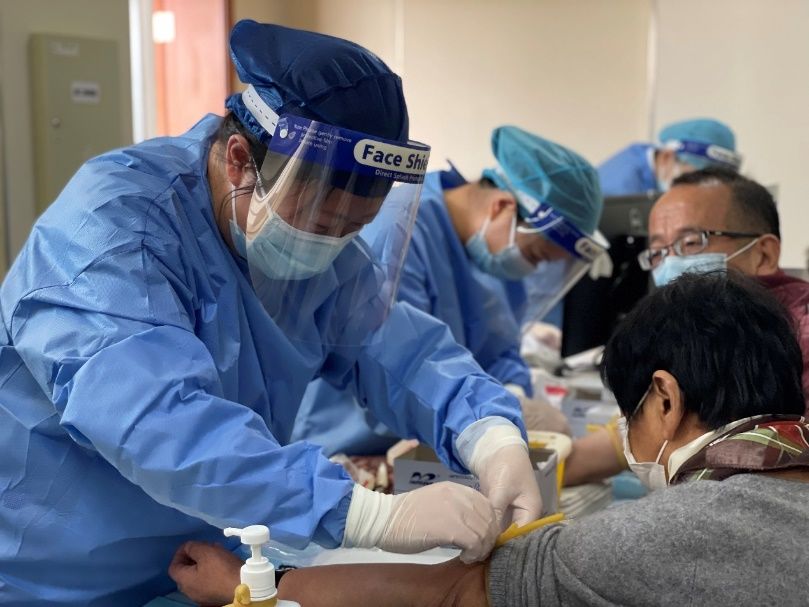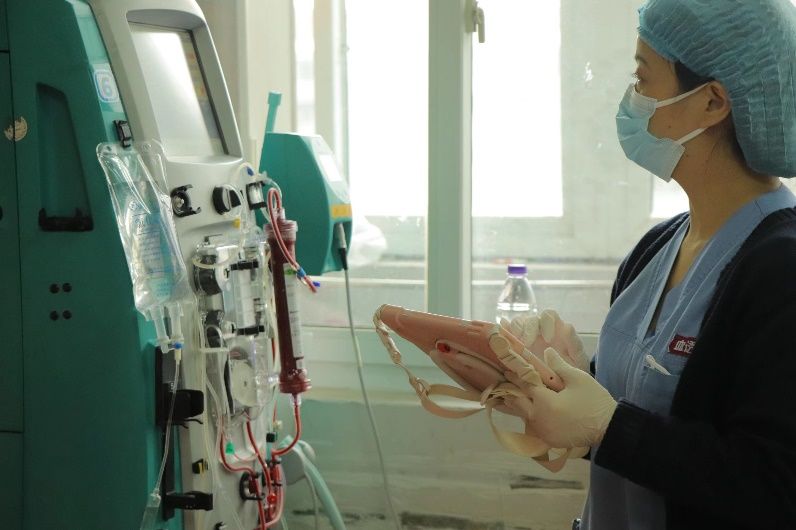
Since yesterday, the screening work in Puxi has been in full swing.
On the evening of March 27, when the announcement of the launch of the nucleic acid screening was released, the Department of Nephrology of Tongji Hospital Affiliated to Tongji University responded quickly to ensure the normal treatment of more than 200 dialysis patients in the hospital, and cut into lockdown control. The special mode of fighting the “epidemic” – immediately activate the emergency mechanism of “closed-loop operation of the dialysis center, non-stop treatment” to protect the health of kidney disease patients and protect the lifeline of dialysis patients.
Due to epidemic prevention and control, how does the hospital ensure that more than 200 dialysis patients are not interrupted for dialysis?
“Doctor, our community has been closed and cannot come out for hemodialysis”
“Is the hemodialysis room of Tongji Hospital? Our hospital has closed-loop management, Can hemodialysis patients come to you?”
“Director, our hospital will be closed for management from today, and the surrounding hospitals are saturated with hemodialysis patients. What should we do with our hemodialysis patients?”
For chronic renal failure patients on hemodialysis, if the hemodialysis cannot be guaranteed in time, it means that their life is difficult to continue.
On the eve of the epidemic lockdown, the nursing team of Tongji Hospital Dialysis Center contacted the patients one by one. “Make sure that all patients are notified, and not one is missing,” the head nurse of the dialysis center kept stressing during shift shifts. It took only 6 hours for the Tongji Kidney team from the time when the hospital closed the loop to formulate a non-dialysis guarantee plan for the dialysis center to when 220 patients were notified.

At 6 o’clock the next day, all the staff of the Department of Nephrology will be on duty, one-to-one, according to the closed-loop dialysis process, to transfer dialysis patients . During the closed-loop period, the dialysis center was running 24 hours a day, and it was almost 4 am the next day after the latest batch of patients got off the plane.
The dialysis room of the brother hospital is closed and controlled, how to ensure the normal dialysis of patients diverted from other hospitals?
When he learned that the dialysis center of the Brother Hospital was closed and urgently needed to divert dialysis patients, Yu Chen, director of the Department of Nephrology of Tongji Hospital, volunteered to accept 60 patients for dialysis.
The Hemodialysis Center of Nephrology Department, together with the outpatient and emergency department, laboratory department, medical insurance office, and charging center, opens up a one-stop green channel for diverting patients from other hospitals, including medical insurance transfer for serious diseases, registration, prescription, blood drawing, nucleic acid collection One-stop service – while maximizing the patient’s medical experience, it also avoids the risk of cross-infection caused by patients walking back and forth in the hospital.
With the joint efforts of all participating departments, patients in other hospitals completed transfer procedures and necessary medical examinations within 2 hours, all reports were issued within 4 hours, and dialysis treatment began that night.
Saving lives matters! They go all out to save the critically ill patients.
Tongji Hospital is the only tertiary first-class general hospital in Putuo District, and it is responsible for the district and even the Huxi area. Critical care visits.
During the normalized epidemic prevention and control period, the Department of Nephrology has drawn up detailed emergency plans for various types of critical kidney diseases in advance, reserved beds in the Nephrology Intensive Care Unit (KICU), and the hemodialysis center is on call 24/7 , providing bedside dialysis treatment for critically ill patients at any time.
Since the current round of the epidemic, the hemodialysis center has performed more than 60 cases of critically ill bedside dialysis.

“For critically ill patients who have no nucleic acid report, we will place a special buffer ward in a special buffer ward before the nucleic acid report is released. Treat. No matter what, saving lives always comes first,” said Wang Aili, head nurse at the dialysis center.
In order to deal with various situations, the hemodialysis nurses are assigned to each person, each of whom is responsible for 10-15 hemodialysis patients, and contacts by phone and WeChat every day, including but not limited to their condition changes, The implementation of the hemodialysis unit, the procedures for transferring to the hospital, the daily nucleic acid reception and channel guidance, communicating with the hospital departments at all levels to open the admission operation for emergency complications for them, paying the fee for the patient to check the admission, and contacting the community neighborhood committee for closure and control During the patient’s round-trip hemodialysis.
During the epidemic, the director of the department and the head nurse have a heavy responsibility. The director of the department is stationed at work 24 hours a day. The head nurse communicates with patients every day until her voice is hoarse, but they say this: “A patient on hemodialysis is a Our family, we can feel at ease when they are well. I wish you all the best!”
Editor: Li Chenyan
Responsible editor: Jiang Peng
Photo source: Courtesy photo
< section>
*Wenhui’s exclusive manuscript, please indicate the source when reprinting.